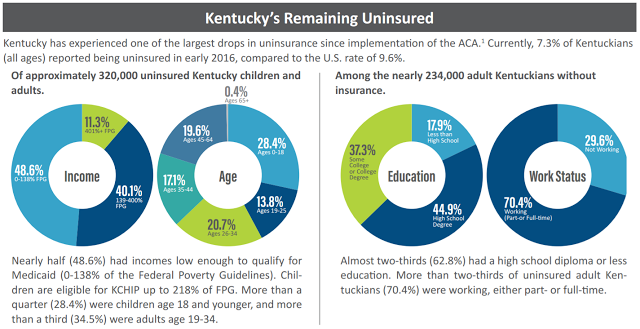Foundation asks Congress to consider that 70 percent of Kentuckians without health insurance are working

Kentucky Health News
Kentucky had the largest percentage decline in its uninsured population from the Patient Protection and Affordable Care Act. But 234,000 Kentuckians still don’t have health insurance, and most of them are working, according to a study done for the Foundation for a Healthy Kentucky.
More than 70 percent of Kentuckians without health insurance are either working part- or full-time, and nearly half of them have incomes low enough to qualify for Medicaid but are not in the program, according to the latest installment of a study of Obamacare’s impact in Kentucky, by the State Health Data Assistance Center at the University of Minnesota.
The study found that 48.6 percent of the uninsured had household incomes at or below 138 percent of the federal poverty level, which means they qualify for Medicaid. Another 40.1 percent had incomes between 138 and 400 percent of poverty, meaning they qualify for subsidized health insurance under the reform law.
Foundation President and CEO Ben Chandler, who voted against the law when he was a member of Congress, encouraged his former colleagues to take these facts into consideration as they work to repeal and replace Obamacare.
“A significant majority of uninsured Kentuckians were working adults, and most had at least a high school education, yet many were still struggling to make ends meet,” Chandler said in a news release. “Health system reforms must take these facts into account to ensure that hard-working, low-income Kentuckians have access to important wellness care and preventive health screenings that can improve the quality of their lives while reducing costs for the entire health care system.”
The state’s expansion of Medicaid under the law allows enrolment by individuals with annual incomes up to $16,394 and families of four with incomes up to $33,534. Before the expansion, the income limit was 69 percent or less of the federal poverty line.
The report says many of the still uninsured in the state are children, at 28.4 percent, or between the ages of 19 and 34, at 34.5 percent.
“We simply have to get the younger population covered by insurance, public or private, so they can get the health care they need to reduce their chances of developing chronic diseases later in life,” Chandler said.
